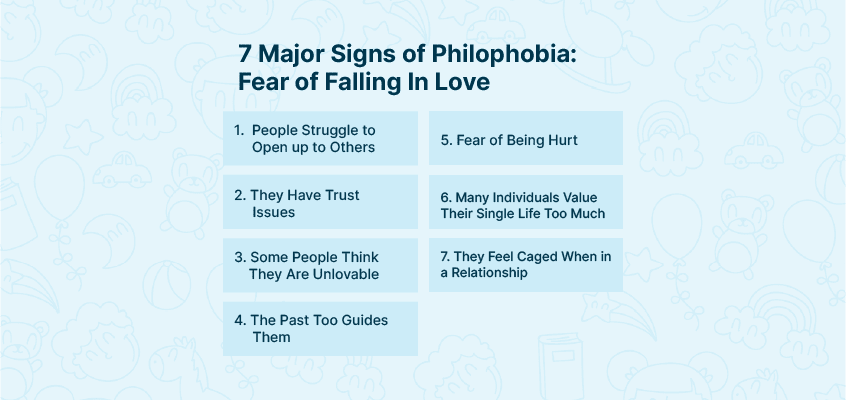Introduction
Love is one of life’s most beautiful and magnificent aspects, yet it can also be terrifying. While some fear is natural, some people find the idea of falling in love horrifying. Not everyone, however, is fortunate in love. Worse still, not everyone is looking for love. There are specific individuals for whom love seems not as something lovely but as something dismal as if they are afraid of it!
On the other hand, the fear of love is not an abstract idea, as you may believe. Fear of love is genuine, perhaps as natural as love, and maybe severe enough to be classified as a phobia. Philophobia is the fear of falling in love or, more accurately, falling in love.
Our Wellness Programs
Looking for services related to this subject? Get in touch with these experts today!!
Experts

Kirti Bajpai

India
Psychologist
Experience: 5 years

Neelam Parwani

India
Life Coach
Experience: 5 years

Ritu Singh

India
Life Coach
Experience: 16 years

Davis Emerson

India
Psychologist
Experience: 6 years

SEEMA TANEJA

India
Psychologist
Experience: 30 years

Ruchi Garg

India
Psychologist
Experience: 6 years
What Is Philophobia?
Many individuals have a slight dread of falling in love at some point in their lives. The dread of falling in love is known as Philophobia. It might also be a fear of getting into a relationship or not keeping a relationship going. On the other hand, Philophobia may make individuals feel alone and unwanted in extreme circumstances. Philophobia is not a medical ailment. Even yet, mental health specialists may frequently assist if Philophobia is badly hurting their lives.
How to Deal with Philophobia of the content 7 Major Signs of Philophobia: Fear of Falling In Love
Here are seven signs of Philophobia some people could have to figure out if they’re one of the many people who have this not-so-common dread of something so coveted.
1. People Struggle to Open up to Others
They may have friendships if they have Philophobia, but most of their interactions are superficial since they are frightened of opening up, displaying their vulnerabilities, and expressing their thoughts.
2. They Have Trust Issues
Trusting their lover to be true to them and not hurt them is essential for falling in love. If they have Philophobia, depending on people in close relationships will be exceedingly difficult, and they may continually mistrust their partner’s motives.
3. Some People Think They Are Unlovable
This thought might occur because of a lack of confidence or awareness of the inner demons that haunt them. Someone who believes they are undeserving of all love and attention is prone to fear love as too perfect for the perfectionist to achieve.
4. The Past Too Guides Them
Past trauma directing future relationships is a vicious cycle of apprehension that can potentially contribute to the development of Philophobia. It’s tough to journey far into the labyrinths of love in quest of a light they haven’t yet seen.
5. Fear of Being Hurt
It’s understandable for someone to feel disillusioned and fearful of falling in love if they’ve gone through horrific events and haven’t let go of their emotional weight. In other words, every sensation that arises is entirely regulated not to experience pain again.
6. Many Individuals Value Their Single Life Too Much
Even while this is a good thing because being alone is always preferable to being in a destructive relationship, they’ve accepted it to the point where they can’t picture sharing their life with anyone else and have given up on love.
7. They Feel Caged When in a Relationship
They can’t envision just one person for the rest of their life; therefore, the prospect of having to commit to just one person for the rest of their life terrifies them to death.
How Can You Overcome Philophobia?
They may also assist themself overcome their phobia of falling in love by doing activities on their own. They may do these exercises on their own or with the help of a therapist:
- Examine their relationship history to discover whether they fear repeating a previous pain in a new relationship.
- Recognise the negative voices in their thoughts that keep them from feeling fulfilled in their relationships.
- Allow them to experience uncomfortable feelings; this is the only way to overcome such problems.
- Inquire about or assess their prior beliefs about relationships.
- Recognise the sources of their defences that restrict them from opening out to others.
How to Help Someone Who Has Philophobia?
Unfortunately, if they have this fear, their doctor will not identify it because the Diagnostic and Statistical Manual of Mental Disorders (DSM) has not recognised it. Medications that assist with emotional baggage and physical symptoms and cognitive behavioural therapy can treat Philophobia, just like any other phobia.
Antidepressant medications treat the phobia’s unpleasant psychological and bodily effects. However, CBT or Cognitive Behavioral Therapy is the most effective treatment for combating the adversary known as Philophobia and most other phobias.
They may also apply counter-conditioning or systematic desensitisation treatment. Therapists gradually expose you to the thought of falling in love to desensitise you to your fear. As you become more comfortable with the concept of falling in love, they may assign you real-world duties.
Dealing with Philophobia
If they notice that they have Philophobia, it may be time to seek help, especially if their relationships are not well. They probably have some valid mental health requirements that might improve with therapy if they dread love and intimate connection that interferes with their social functioning in everyday life.
Conclusion
Finding the right therapist can demand a lot of time and research and could be a process of trial and error. If they are ready to work with someone, start by researching different types of therapy, so they will understand how a particular therapist will approach working with them.
United We Care, an online platform for mental health wellness and therapy, helps to get expert guidance dealing with mental and emotional problems. United We Care arose from a goal to give equal and inclusive access to help people worldwide – safely, securely, and conveniently from the comfort of one’s own home.


 Conflict Management in Relationships
Conflict Management in Relationships
 Healing from Heartbreak
Healing from Heartbreak Coping With Anxiety
Coping With Anxiety Get Started With Mindfulness
Get Started With Mindfulness Healing With Meditation
Healing With Meditation







